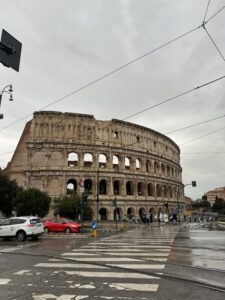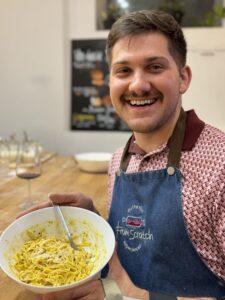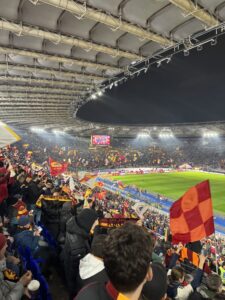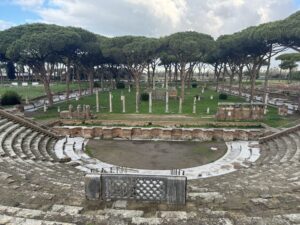Settling into Rome wasn’t about checking off tourist spots—it was the daily hustle, the crash course in history, and the unexpected lessons in a city that’s been around forever.
Day one was like walking through a live-action history lesson. Standing in the Colosseum, I wasn’t just seeing ancient stones; I was walking in the footsteps of emperors and gladiators. Then there was the Vatican; its sheer size and beauty were breathtaking. It’s one thing to read about these places, but it’s another to feel the cool marble and hear the echo of your steps in halls where history was made.
I was expecting the food to be good but not life-changing. That thought changed when I bit into a sandwich the size of a cake and later had the best carbonara of my life. Even a simple panini at a soccer game was a pleasant surprise. And making my own pasta? It’s not just the taste—it’s the satisfaction of creating something from scratch, the way Italians have for centuries.
The soccer game was an eye-opener too. It wasn’t just about the sport; it was about the community. The fans’ passion was a fiery reminder that Rome is more than its historical past.
But Rome also taught me about the business of culture. Visiting a marble factory, I learned how a block of stone can turn into a fortune. It made me see the city’s statues and buildings in a new light—not just as art, but as commerce, industry, and livelihoods.
The Aggie Scavie hunt was a highlight, pushing me to interact, to be more than just a visitor. I learned to navigate, to communicate, and to think on my feet. It was like a picture of life—you plan, you act, and sometimes, you get it wrong. But you keep going.
I grew in Rome. I learned to appreciate the art in every corner, to find my way through streets that felt like mazes, and to communicate with gestures when words failed me. Every day was a test of adaptability and patience, from figuring out bus routes to haggling over leather bags. And through these tests, I found confidence.
The biggest surprise wasn’t found in the monumental landmarks, but in the simple moments: a conversation with a vineyard owner about the business behind her wine, or the realization that the best meals aren’t always in the fanciest places—they’re in the small joints filled with locals.
Rome was more than a study-abroad location; it was a challenge that demanded to be met. From the Trevi Fountain to the underground crypts, every site and interaction had a lesson to teach. They said, “Here’s life, in all its chaotic beauty. Deal with it.”
And deal with it I did. I bartered, I got lost, I made friends, and I found pieces of myself in the cobbled streets and ancient ruins. I leave Rome not just with a heavier suitcase but with a lighter heart, one that’s ready to take on whatever comes next with a bit of Roman flair.
The benefit of Rome? The growth comes from living a life that’s so different from your own, yet feeling right at home. It’s the realization that the world is vast, but not so intimidating once you start exploring it. And it’s understanding that history is not just something you read about—it’s something you live, something you feel, and now, something I carry with me in the form of a refrigerator magnet.




